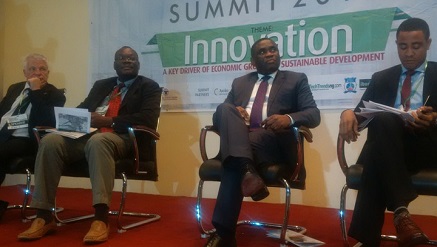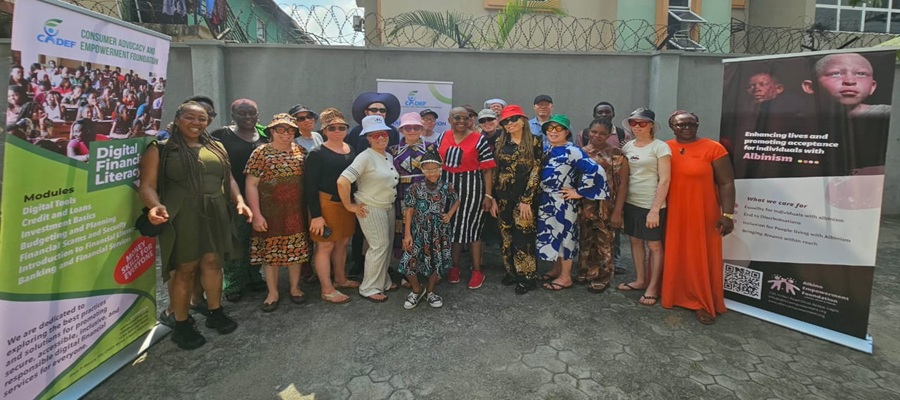News
NIS2016: NCC, Dokita, SFH, Others Discuss Innovation in Nigeria

The innovative application of ICT in some other sectors of the economy in Nigeria has become one of the major successful outcomes of the country’s telecommunications regulations, according to Professor Umar Danbatta, executive vice chairman of the Nigeria Communications Commission (NCC).
The EVC who spoke through Mr. Tony Ojobo, director, Public Affairs at the Commission at the opening of two-day Nigeria Innovation Conference (#nis2016), cited the pharmaceutical industry where the authenticity of drugs are now verified through the use of mobile phones, as one of the innovations powered by telecommunications industry.
He said that in the agricultural sector, “We are all aware of the innovation where farmers were equipped with mobile phones and they are able to be reached for distribution of fertilizers and other critical infrastructure that have given them better yields.
“In the movie industry, as represented by Nollywood, the Commission has taken steps to collaborate with the actors and producers evolve better ways to distribute their contents to the worldwide audience and also to improve their production capabilities through the application of relevant technologies available in other parts of the world”.
The EVC said that innovation is one of the main eight-point agenda of the current leadership of the Commission. “The fourth item of that agenda, in particular, seeks to promote ICT innovation and investment opportunities. By this, the Commission makes conscious efforts to promote ICT innovations in ways that improve the nation’s ability to compete in the global economy, increase investments in youths, and promote SMEs for new businesses deliveries and breakthroughs”.
Speaking on ‘How Nigeria Higher Education System can drive Innovation: Opportunities for Collaboration and Partnership for Economic Development’, Dr. Tunde Adekola, senior education specialist at World Bank, said “What it means to be ‘innovative’ in 2015 may be different than it was in 1885 or 1985 (and it will perhaps be different still in 2085). That said, there is little argument that, whatever the year, and wherever you are, basic numeracy and literacy skills are fundamental to one’s education and ability to navigate successfully through life now require learning and innovation skills , statistical literacy, digital literacy skills, life and career skills”.
He said that both innovation and higher education are important for national development and must be value added, as “In midst of competition, time is also of essence. It is not only about what we know but when do we know it. Innovation makes all the difference between a developed and marginalized economy “
“Developing countries will have little success boosting economic growth and reducing poverty unless they can close a growing “S&T Innovation” divide between themselves and richer countries. With on-going recession or depression and the resolve of this gathering to strengthening partnership collaboration and cooperation between states and non-state actors, there is now and unique opportunity for innovation, interconnectivity, invigoration and inclusiveness for quality and S&T education.
He added that quality education remains the critical determinant of a country’s economic growth and standard of living as learning outcomes are transformed into goods and services, greater institutional capacity, a more effective public sector, a stronger civil society, and a better investment climate.
Also speaking, Dr. Daniel Folukoya, founder and CEO, OneDokita, Healthcare Limited, said that as young inventors they were challenged by the poor patient-doctor interface in the Nigeria’s healthcare system, hence the development of 1dokita platform.
“On the course of our research, the need for reliable data in the healthcare system actually informed the innovation- Onedokita. For instance, we may want to pick up cases for treatment like Diabetes; we know people in England have such cases at different levels, because statistics are there to assist your programme. But when we are looking at the Nigerian situation, digitally, there is very little data on that. What we actually is that there are data on HIV, malaria and tuberculoses (TB).
“But these illnesses come and kill quickly in terms of the worst case scenario. But what happens is that as you are treating HIV, malaria and TB, the life span of each person becomes longer, however the lifestyle diseases like hypertension, if you ask anybody about the data, we do not know,” he said.
He however called for more flexible regulatory system to spur more innovations in the country. “Nigeria is economically in recession, but technologically we are turning a corner reaching a threshold that will ‘burst’ and expand, which will trigger a turnaround in the nation’s economy. Due to our optimism we are building relationships and trusts in the market. We just need to recognise innovation in whatever sector of the country by way of flexible regulations”.
Meanwhile, Sir Bright Ekweremadu, managing director, Society for Family Health (SFH), said that over time, the public health sector in Nigeria has experienced increase in the use of innovative strategies and technologies in the delivery of health care services.
He highlighted some of the innovations as include the use of mobile technologies in data management, task shifting strategies to curb the effect of shortage of human resources, the use of mobile doctors to deliver health services in emergencies by the Flying Doctors Nigeria, effective containment of Ebola Virus Disease through prompt case management, surveillance, contact tracing, communication and social mobilization by Ebola Alert among others.
Ekweremadu said that SFH as a leading public health non-governmental organisation in Nigeria, with over 30 years of experience in delivering public health services adopts various innovative strategies in the delivery of health services to empower Nigerians particularly the poor and vulnerable, to lead healthier lives in line with her mission statement.
The speakers unanimously called for improved support from the government for conducive environment, especially to protect ‘weak’ innovators from the giant companies.
News
OpenAI Launches ChatGPT Health

OpenAI maker of ChatGPT is rolling out a health-focused feature to the generative artificial intelligence (AI) tool that’s used by nearly a billion users.

Named ChatGPT Health, the new feature aims to provide users with health and wellness information. This, as health is one of the most common ways people use ChatGPT, according to OpenAI.
In a blog post, Microsoft-backed OpenAI says de-identified analysis of conversations show that over 230 million people globally ask health and wellness-related questions on ChatGPT every week.
ChatGPT Health will also “securely” connect medical records and wellness apps to ground conversations with a user’s own health information, making responses more relevant and useful.
“Designed in close collaboration with physicians, ChatGPT Health helps people take a more active role in understanding and managing their health and wellness – while supporting, not replacing, care from clinicians.”
According to OpenAI, health information is often scattered across portals, apps, wearables, PDFs, and medical notes making it hard to see the full picture, and people are left to navigate a complex healthcare system on their own.
“ChatGPT Health builds on these so responses are informed by your health information and context. You can now securely connect medical records and wellness apps – like Apple Health, Function, and MyFitnessPal – so ChatGPT can help you understand recent test results, prepare for appointments with your doctor, get advice on how to approach your diet and workout routine, or understand the trade-offs of different insurance options based on your healthcare patterns.”
According to the company, ChatGPT Health is designed to support, not replace, medical care, adding that it is not intended for diagnosis or treatment. “Instead, it helps you navigate everyday questions and understand patterns over time – not just moments of illness – so you can feel more informed and prepared for important medical conversations.
“To keep your health information protected and secure, Health operates as a separate space with enhanced privacy to protect sensitive data. Conversations in Health are not used to train our foundation models. If you start a health-related conversation in ChatGPT, we’ll suggest moving into Health for these additional protections.”
OpenAI adds that access to ChatGPT Health has started with a small group of early users to learn and continue refining the experience, adding that users with ChatGPT Free, Go, Plus, and Pro plans outside of the European Economic Area, Switzerland, and the UK are eligible.
“As we make improvements, we plan to expand access and make Health available to all users on web and iOS in the coming weeks.
“Medical record integrations and some apps are available in the US only, and connecting Apple Health requires iOS.”
News
Kaspersky Shares AI Cybersecurity Predictions for 2026

Kaspersky experts outline how the rapid development of AI is reshaping the cybersecurity landscape in 2026, both for individual users and for businesses. Large language models (LLMs) are influencing defensive capabilities while simultaneously expanding opportunities for threat actors.

Deepfakes are becoming a mainstream technology, and awareness will continue to grow. Companies are increasingly discussing the risks of synthetic content and training employees to reduce the likelihood of falling victim to it. As the volume of deepfakes grows, so does the range of formats in which they appear.
At the same time, awareness is rising not only within organisations but also among regular users: end consumers encounter fake content more often and better understand the nature of such threats. As a result, deepfakes are becoming a stable element of the security agenda, requiring a systematic approach to training and internal policies.
Deepfake quality will improve through better audio and a lowering barrier to entry. The visual quality of deepfakes is already high, while realistic audio remains the main area for future growth.
At the same time, content generation tools are becoming easier to use: even non-experts can now create a mid-quality deepfake in just a few clicks. As a result, the average quality continues to rise, creation becomes accessible to a far broader audience, and these capabilities will inevitably continue to be leveraged by cybercriminals.
Online deepfakes will continue to evolve but remain tools for advanced users. Real-time face and voice swapping technologies are improving, but their setup still requires more advanced technical skills. Wide adoption is unlikely, yet the risks in targeted scenarios will grow: increasing realism and the ability to manipulate video through virtual cameras make such attacks more convincing.
Efforts to develop a reliable system for labelling AI-generated content will continue. There are still no unified criteria for reliably identifying synthetic content, and current labels are easy to bypass or remove, especially when working with open-source models. For this reason, new technical and regulatory initiatives aimed at addressing the problem are likely to emerge.
Open-weight models will approach top closed models in many cybersecurity-related tasks, which create more opportunities for misuse. Closed models still offer stricter control mechanisms and safeguards, limiting abuse.
However, open-source systems are rapidly catching up in functionality and circulate without comparable restrictions. This blurs the difference between proprietary models and open-source models both of which can be used efficiently for undesired or malicious purposes.
The line between legitimate and fraudulent AI-generated content will become increasingly blurred. AI can already produce well-crafted scam emails, convincing visual identities, and high-quality phishing pages.
At the same time, major brands are adopting synthetic materials in advertising, making AI-generated content look familiar and visually “normal.” As a result, distinguishing real from fake will become even more challenging, both for users and for automated detection systems.
AI will become a cross-chain tool in cyberattacks and be used across most stages of the kill chain. Threat actors already employ LLMs to write code, build infrastructure, and automate operational tasks.
Further advances will reinforce this trend: AI will increasingly support multiple stages of an attack, from preparation and communication to assembling malicious components, probing for vulnerabilities and deploying tools. Attackers will also work to hide signs of AI involvement, making such operations harder to analyse.
“While AI tools are being used in cyberattacks, they are also becoming a more common tool in security analysis and influence how SOC teams work. Agent-based systems will be able to continuously scan infrastructure, identify vulnerabilities, and gather contextual information for investigations, reducing the amount of manual routine work.
“As a result, specialists will shift from manually searching for data to making decisions based on already-prepared context. In parallel, security tools will transition to natural-language interfaces, enabling prompts instead of complex technical queries,” adds Vladislav Tushkanov, Research Development Group Manager at Kaspersky.
News
Nigerians with Albinism Reject Pity, Demand Dignity at Empowerment Forum

Nigerians living with albinism say their biggest challenge is not skin sensitivity or poor eyesight, but being seen, heard and treated as full human beings, a message that resonated at a recent empowerment session hosted by the Consumer Advocacy and Empowerment Foundation (CADEF) and Albino Empowerment Foundation.

CADEF
The event last Saturday focused on lived experiences, self-advocacy and rights awareness rather than handouts, though participants received food, protective clothing and skin/eye care materials.
CADEF Executive Director, Prof. Chiso Ndukwe-Okafor, said real progress requires respect and inclusion, not pity, adding that knowledge of human rights equips people to demand fairness.
“Dignity begins when people are seen fully and treated equally,” she said.
Ifeoma Ngesina, founder of Albino Empowerment Foundation, defined inclusion as equal rights and participation in decisions affecting their lives, not stereotypes.
“When persons with albinism are included in schools, workplaces, leadership and media, harmful myths fade,” she said, stressing it builds confidence and leadership.
CADEF Advisory Board Member, Ms Kobi Ikpo, urged participants to own their narrative: “If you do not tell people how to treat you, they will not know how to address you. Once you accept yourself as a complete human being deserving of respect, it reflects in how you carry yourself — and that confidence commands respect.”
Afolake Odudinu highlighted parental ignorance leading to school dropouts, skin damage from sun exposure and social/marital stigma, noting skin cancer treatment remains inaccessible for many.
Efosa Peter, a father and associate pastor, rejected pity for genuine empowerment: “I hate pity. I don’t want to be pitied — I want empowerment.” He described persons with albinism as creatively gifted and warned against insincere initiatives.
“Empowerment must include self-esteem and self-motivation. When you see yourself as whole, others will follow,” he said.
Teacher Rose Adudu shared overcoming school bullying through discipline and advocacy, helping enrol a young albino girl in school despite later parental withdrawal.
“Your character will speak for you,” she said.
Participants were encouraged to use content creation for education and myth-busting, with CADEF planning annual events and advancing Digital Financial Inclusion Rights for Persons With Disabilities.
The forum underscored a core demand: opportunity, understanding and respect over sympathy.

 Telecom3 days ago
Telecom3 days agoSamsung Plans to Double AI Mobile Devices to 800 million Units this Year

 E-Financial3 days ago
E-Financial3 days agoZacch Adedeji says Rebranded NRS will Overhaul Revenue Administration

 Telecom2 days ago
Telecom2 days agoNITDA DG Charts Bold Path for Innovation-Led Digital Boom in North

 News2 days ago
News2 days agoINEC Warns of Fake Ad-hoc Staff Recruitment Portal

 News2 days ago
News2 days agoNRS Boss Dismisses Fears of Political Weaponisation in Tax Reforms

 Telecom2 days ago
Telecom2 days agoMandatory Biometric Verification for Starlink Users in Nigeria Begins

 E-Financial2 days ago
E-Financial2 days agoSenders Now to Pay N50 Stamp Duty – GT Bank

 E-Financial2 days ago
E-Financial2 days agoEcobank Offsets Repayment of $300m Eurobond Notes















